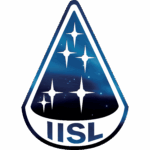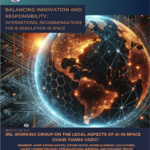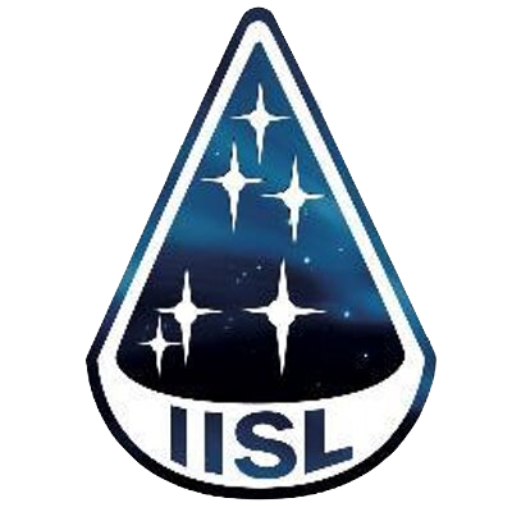The Working Group is closed.
Working Group Overview
The IISL AI Study Group, initiated and coordinated by IISL member Tuana Yazici, is dedicated to exploring the intersection of artificial intelligence (AI) and space law, and building frameworks for how AI should be regulated in space. This initiative, titled “Balancing Innovation and Responsibility: International Recommendations for AI Regulation in Space,” aims to address the legal, regulatory, and ethical dimensions of AI applications in space activities. The working group is chaired by Tuana Yazici and comprises esteemed members: Anne-Sophie Martin, Steven Wood, Lisa Kucher, Roser Almenar, Laura Yvonne Zielinski, Stefan-Michael Wedenig, and Giovanni Tricco.
Aims and Objectives
- The primary aims and objectives of the IISL AI Study Group are to:
- Examine the current landscape of AI technologies in space activities, including their applications in space traffic management, satellite operations, communications, robotics, and data analytics.
- Analyze the legal frameworks relevant to AI in space, drawing parallels from the Outer Space Treaty and the Liability Convention to understand where AI fits within these scenarios.
- Investigate the regulatory aspects of AI, emphasizing export control procurement issues and telecommunications laws that impact the transfer and use of AI technologies in space.
- Address the ethical concerns related to AI through case studies and propose guidelines for ethical AI deployment in space.
- Explore the role of AI in environmental protection in space, including autonomous monitoring, collision prediction, and space debris removal.
- Develop recommendations for international cooperation and robust frameworks based on the International Civil Aviation Organization (ICAO) and the International Maritime Organization (IMO) to govern the ethical and responsible use of AI in space.
Methodology
The methodology adopted by the IISL AI Study Group involves a comprehensive review of existing legal and regulatory frameworks, case studies analysis, and interdisciplinary research. This will include insights from international human rights law, robotics, genetics, autonomous vehicles, and privacy protection regulations. The study will also incorporate collaboration with international legal experts and space law practitioners, culminating in a final report outlining findings and recommendations.
Outcomes
The expected Outcomes of the Working Group are as follows:
- A detailed report outlining the current state of AI technologies in space and their implications.
- Legal analysis and recommendations for updating international treaties to accommodate AI advancements.
- Regulatory guidelines for the secure transfer and use of AI technologies in space, addressing export control and telecommunications issues.
- Ethical guidelines for AI deployment in space, based on lessons from other high-stakes technologies.
- Frameworks for using AI in environmental protection, enhancing space sustainability and safety.
- Recommendations for creating international authorities to ensure cooperation and establish standardized regulations for AI in space activities.
Timeline of the Working Group
April 2024 – December 2024
- The Working Group presented their paper during the International Astronautical Congress (IAC) in Milan in October 2024 to the IISL Board Members.
- Following the presentation, the report was finalized after the board review for publication.
Final report of the Working Group
The Working Group on Legal Aspects of AI in Space’s Final Report entitled “Balancing Innovation and Responsibility: International Recommendations for AI Regulation in Space” can be found below.
© 2024 International Institute of Space Law (IISL)
This publication may be shared for non-commercial educational or research purposes with appropriate attribution. No part of this report may be altered, sold, or used for commercial purposes without prior written permission from the International Institute of Space Law.
Suggested citation
Yazici, Tuana (Working Group Chair) et al., Balancing Innovation and Responsibility: International Recommendations for AI Regulation in Space. International Institute of Space Law (IISL), Paris, December 2024.
Published by the International Institute of Space Law (IISL)
94bis, Avenue de Suffren 75015 Paris, France
December 2024
Archives
- IISL Working Group on AI in Space Featured in Stanford Law School Policy Lab
 The International Institute of Space Law (IISL) Working Group on the Legal Aspects of Artificial Intelligence in Space was recently featured as a core component of Stanford Law School’s Space Law & Policy Lab, “Governing Autonomous & AI-Enabled Systems in Outer Space,” a two-quarter policy lab advising The Aerospace Corporation,
The International Institute of Space Law (IISL) Working Group on the Legal Aspects of Artificial Intelligence in Space was recently featured as a core component of Stanford Law School’s Space Law & Policy Lab, “Governing Autonomous & AI-Enabled Systems in Outer Space,” a two-quarter policy lab advising The Aerospace Corporation, - AI study presentation in Singapore
 IISL’s study on “Legal Aspects of AI in Space” was presented by study leader Tuana Yazici at a workshop organised by the Konrad Adenauer Foundation’s office in Singapore. The framework for the workshop was the KAS programme on rule of law focussing on national space legislation with a comparative view
IISL’s study on “Legal Aspects of AI in Space” was presented by study leader Tuana Yazici at a workshop organised by the Konrad Adenauer Foundation’s office in Singapore. The framework for the workshop was the KAS programme on rule of law focussing on national space legislation with a comparative view - Impact of the IISL Working Group on Legal Aspects of AI in Space
 In April 2024, the Board of Directors of the International Institute of Space Law (IISL) formally established the Working Group on Legal Aspects of AI in Space, chaired by Tuana Yazici, with Anne-Sophie Martin, Steven Wood, Lisa Kucher, Roser Almenar, Laura Yvonne Zielinski, Stefan-Michael Wedenig, and Giovanni Tricco. Over the
In April 2024, the Board of Directors of the International Institute of Space Law (IISL) formally established the Working Group on Legal Aspects of AI in Space, chaired by Tuana Yazici, with Anne-Sophie Martin, Steven Wood, Lisa Kucher, Roser Almenar, Laura Yvonne Zielinski, Stefan-Michael Wedenig, and Giovanni Tricco. Over the - IISL publishes Report of IISL Working Group on Legal Aspects of AI in Space
 More recent developments of a widespread use of Artificial Intelligence (AI) are affecting many areas of human life on Earth, as well as human activities in outer space. In April 2024, the Board of Directors of IISL agreed to form a new ‘Working Group on on Legal Aspects of AI
More recent developments of a widespread use of Artificial Intelligence (AI) are affecting many areas of human life on Earth, as well as human activities in outer space. In April 2024, the Board of Directors of IISL agreed to form a new ‘Working Group on on Legal Aspects of AI - IISL holds lunchtime events at IAC 2024
 15/16 October 2024. During this year’s IAC in Milan, IISL held two informative lunchtime events at the side of its annual Colloquium on the Law of Outer Space. The events were open to IISL members as well as IAC participants. On Wednesday, 16 October 2024, IISL hosted a General Counsel
15/16 October 2024. During this year’s IAC in Milan, IISL held two informative lunchtime events at the side of its annual Colloquium on the Law of Outer Space. The events were open to IISL members as well as IAC participants. On Wednesday, 16 October 2024, IISL hosted a General Counsel
